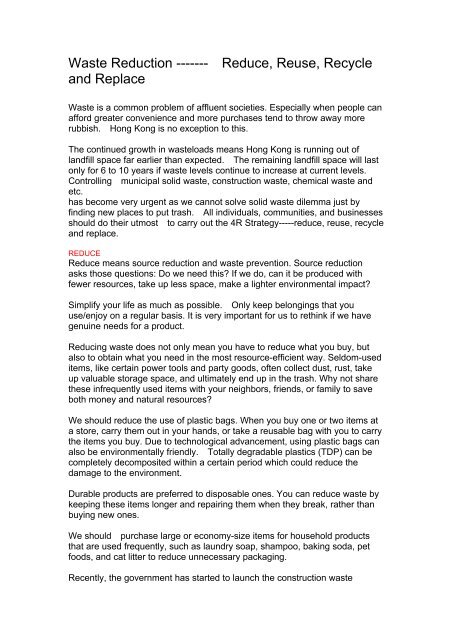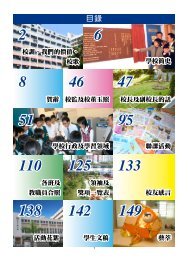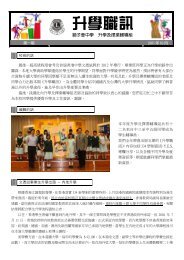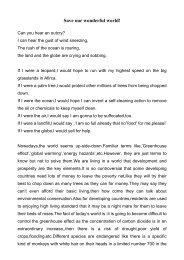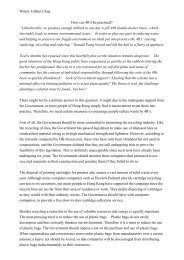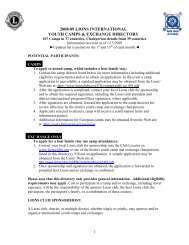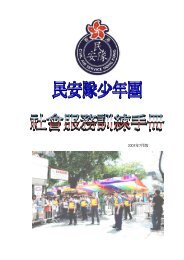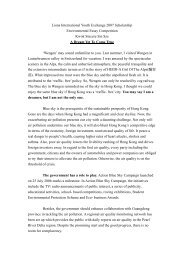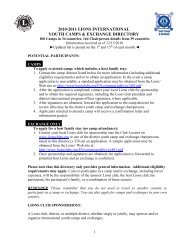Waste Reduction ------- Reduce, Reuse, Recycle and Replace
Waste Reduction ------- Reduce, Reuse, Recycle and Replace
Waste Reduction ------- Reduce, Reuse, Recycle and Replace
Create successful ePaper yourself
Turn your PDF publications into a flip-book with our unique Google optimized e-Paper software.
<strong>Waste</strong> <strong>Reduction</strong> ------- <strong>Reduce</strong>, <strong>Reuse</strong>, <strong>Recycle</strong><br />
<strong>and</strong> <strong>Replace</strong><br />
<strong>Waste</strong> is a common problem of affluent societies. Especially when people can<br />
afford greater convenience <strong>and</strong> more purchases tend to throw away more<br />
rubbish. Hong Kong is no exception to this.<br />
The continued growth in wasteloads means Hong Kong is running out of<br />
l<strong>and</strong>fill space far earlier than expected. The remaining l<strong>and</strong>fill space will last<br />
only for 6 to 10 years if waste levels continue to increase at current levels.<br />
Controlling municipal solid waste, construction waste, chemical waste <strong>and</strong><br />
etc.<br />
has become very urgent as we cannot solve solid waste dilemma just by<br />
finding new places to put trash. All individuals, communities, <strong>and</strong> businesses<br />
should do their utmost to carry out the 4R Strategy-----reduce, reuse, recycle<br />
<strong>and</strong> replace.<br />
REDUCE<br />
<strong>Reduce</strong> means source reduction <strong>and</strong> waste prevention. Source reduction<br />
asks those questions: Do we need this? If we do, can it be produced with<br />
fewer resources, take up less space, make a lighter environmental impact?<br />
Simplify your life as much as possible. Only keep belongings that you<br />
use/enjoy on a regular basis. It is very important for us to rethink if we have<br />
genuine needs for a product.<br />
Reducing waste does not only mean you have to reduce what you buy, but<br />
also to obtain what you need in the most resource-efficient way. Seldom-used<br />
items, like certain power tools <strong>and</strong> party goods, often collect dust, rust, take<br />
up valuable storage space, <strong>and</strong> ultimately end up in the trash. Why not share<br />
these infrequently used items with your neighbors, friends, or family to save<br />
both money <strong>and</strong> natural resources?<br />
We should reduce the use of plastic bags. When you buy one or two items at<br />
a store, carry them out in your h<strong>and</strong>s, or take a reusable bag with you to carry<br />
the items you buy. Due to technological advancement, using plastic bags can<br />
also be environmentally friendly. Totally degradable plastics (TDP) can be<br />
completely decomposited within a certain period which could reduce the<br />
damage to the environment.<br />
Durable products are preferred to disposable ones. You can reduce waste by<br />
keeping these items longer <strong>and</strong> repairing them when they break, rather than<br />
buying new ones.<br />
We should purchase large or economy-size items for household products<br />
that are used frequently, such as laundry soap, shampoo, baking soda, pet<br />
foods, <strong>and</strong> cat litter to reduce unnecessary packaging.<br />
Recently, the government has started to launch the construction waste
disposal charging scheme. Construction waste producers prior to using<br />
Government waste disposal facilities, need to pay for the construction waste<br />
they generate to Environmental Protection Department.<br />
REUSE<br />
You can reuse materials in their original form instead of throwing them away,<br />
or pass those materials on to others who could use them too! Remember, one<br />
man's trash is another man's treasure!<br />
Many everyday items can have more than one use. Before discarding them,<br />
consider if it is hygienic <strong>and</strong> practical to reuse them. Reusing products<br />
extends their lives, keeping them out of the solid waste stream longer.<br />
Instead of discarding unwanted appliances, tools, or clothes, try selling or<br />
donating them. Opting for second h<strong>and</strong> goods, such as books, clothes,<br />
furniture, CDs <strong>and</strong> etc. is very popular in foreign countries as these products<br />
are often less expensive than new or "first-quality" items, <strong>and</strong> using them will<br />
keep them from being thrown away. Besides, you can also donate things that<br />
you don't want to various charitable organizations to help the needy.<br />
When you do use disposables like plastic cups, plates, utensils, <strong>and</strong> plastic<br />
food storage bags, don't throw them away! Wash <strong>and</strong> reuse them -- most<br />
of them will last for a long time with many uses. What's more, remember to<br />
switch from disposable to reusable products: food <strong>and</strong> beverage containers,<br />
cups, plates, writing pens, razors, diapers, towels, shopping bags, etc. <strong>Reuse</strong><br />
scrap paper <strong>and</strong> envelopes.Save <strong>and</strong> reuse gift boxes, ribbons, <strong>and</strong> larger<br />
pieces of wrapping <strong>and</strong> tissue paper.<br />
RECYCLE<br />
When you've done all you can to avoid waste, recycle. Recycling is the<br />
process by which materials are collected <strong>and</strong> used as raw materials for new<br />
products. There are four steps in recycling: collecting the recyclable<br />
components of municipal solid waste, separating materials by type,<br />
processing them into reusable forms, <strong>and</strong> purchasing <strong>and</strong> using the goods<br />
made with reprocessed materials.<br />
Auminium tins, plastic bottles <strong>and</strong> waste paper can be separated <strong>and</strong> put into<br />
the recycling bins. <strong>Recycle</strong>d waste can be made into new products to be<br />
used again to fully utilise our planet's limited resources.<br />
For recycling to succeed, recyclable materials must be processed into new<br />
products, <strong>and</strong> those products must be purchased <strong>and</strong> used. We should select<br />
products made from recycled materials. Use products with recycled content<br />
whenever you can. For instance, many paper, glass, metal, <strong>and</strong> plastic<br />
products contain recovered materials. Some examples are stationery,<br />
wrapping paper, computer paper, <strong>and</strong> many containers. Look for items in<br />
packages <strong>and</strong> containers made of recycled materials. Many bottles, cans,<br />
paper wrappings, bags, cereal boxes, <strong>and</strong> other cartons <strong>and</strong> packages are<br />
made from recycled materials.<br />
REPLACE
Nowadays, durable products are not favoured by manufacturers, as they<br />
reduced sales. Non-durable goods are produced for short period of<br />
consumption <strong>and</strong> then disposed of <strong>and</strong> it would certainly waste energy <strong>and</strong><br />
resources. Therefore, replace non-durable goods by durable goods certainly<br />
helps to conserve the environment.<br />
Besides, during the production processes of non-renewable resources, we<br />
often produce contaminated residues <strong>and</strong> poisonous <strong>and</strong> harmful by-products<br />
that harm the environment <strong>and</strong> our health as well. So we should replace<br />
non-renewable resources by renewable resources. For example, the water<br />
heating system commonly used in Hong Kong is an environmentally friendly<br />
type of system, as it uses renewable solar energy to heat up water.<br />
Furthermore, we should phase out foam lunch boxes by degradable lunch<br />
boxes, replace your newspaper <strong>and</strong> magazines with online news, use hot<br />
water instead of cleaning detergent for washing purpose, replace chemical<br />
fertilizers by organic fertilizers, etc.<br />
We should use wind power instead of fossil fuels to generate electricity. For<br />
example, the Hong Kong Electric Company has planned to construct the<br />
800kW wind turbine on Lamma Isl<strong>and</strong>.<br />
SUMMARY<br />
All parts of society need to work together to change current patterns of waste<br />
generation <strong>and</strong> disposal. The government should take the initiative to help<br />
communities plan <strong>and</strong> carry out the 4R strategy. Manufacturers can design<br />
products that use more recycled materials <strong>and</strong> less packaging. As individuals,<br />
we should also do our bit to reduce trash.<br />
Take action now! We all have the power to influence others <strong>and</strong> help create<br />
the type of world in which we want to live.


